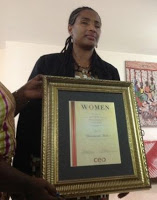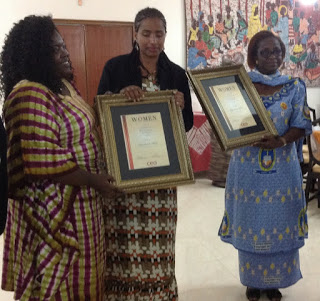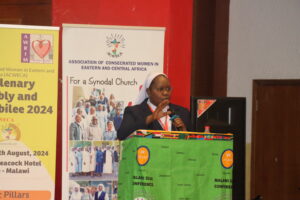ETHIOPIA: AMECEA Woman defies all odds to become a winner

She won the
Most Influential Woman in Africa (MIW) 2015 Award in the category of Welfare
and Civil Society Organizations (Eastern Africa Region). She is a lawyer and founder
of Ethiopian Center for Disability and Development. She holds Master’s Degree
in Social Work and is currently pursuing Executive Masters in Managing Peace
and Security in Africa. She is visually impaired.
Most Influential Woman in Africa (MIW) 2015 Award in the category of Welfare
and Civil Society Organizations (Eastern Africa Region). She is a lawyer and founder
of Ethiopian Center for Disability and Development. She holds Master’s Degree
in Social Work and is currently pursuing Executive Masters in Managing Peace
and Security in Africa. She is visually impaired.
 |
| Yetneberesh Molla Nigussie (Yeti) Displays the Award Certificate She won at the Most Influencial Woman in Africa (MIW) aWARD 2015 |
This is Yetneberesh
Molla Nigussie, fondly referred to as Yeti, a 33-year-old Ethiopian woman, who was
born normal but became blind at the age of five. She says that her disability is
a blessing in disguise, and not a hindrance to achieving her goal. Yeti is
quite talkative, elegant and exudes confidence. She speaks her mind and doesn’t
shy away from defending her point.
Molla Nigussie, fondly referred to as Yeti, a 33-year-old Ethiopian woman, who was
born normal but became blind at the age of five. She says that her disability is
a blessing in disguise, and not a hindrance to achieving her goal. Yeti is
quite talkative, elegant and exudes confidence. She speaks her mind and doesn’t
shy away from defending her point.
“I always
tell people that God has given me this lottery of being blind to live in a
different way because I was born in a remote rural area of Ethiopia where early
marriage is the norm, and so had I not been blind I would have been married off
at the age of nine or ten,” she said.
tell people that God has given me this lottery of being blind to live in a
different way because I was born in a remote rural area of Ethiopia where early
marriage is the norm, and so had I not been blind I would have been married off
at the age of nine or ten,” she said.
“It is often
quite difficult to understand why God let certain things happen; however, when
we try not to focus on the limitations, but look at the brighter side, then
that marks the beginning of our happiness. In the Book of Genesis, God chose Moses,
a man with a speech defect, to lead the Israelites out of Egypt. God had a
choice to pick on a perfect person with no defects at all, an orator. Though
Moses was hesitant owing to his disability God settled on him and so Moses led the
Israelites out of Egypt through the Sinai Desert, a big task indeed. So whatever
situation we are in, whatever defect we might be having, it is important to
realize that there is something God wants to demonstrate.
quite difficult to understand why God let certain things happen; however, when
we try not to focus on the limitations, but look at the brighter side, then
that marks the beginning of our happiness. In the Book of Genesis, God chose Moses,
a man with a speech defect, to lead the Israelites out of Egypt. God had a
choice to pick on a perfect person with no defects at all, an orator. Though
Moses was hesitant owing to his disability God settled on him and so Moses led the
Israelites out of Egypt through the Sinai Desert, a big task indeed. So whatever
situation we are in, whatever defect we might be having, it is important to
realize that there is something God wants to demonstrate.
 |
| H.E. Cardinal Njue, Archbishop Of Nairobi, with Yeti |
“I was born
a normal girl, but at the age of five, I fell very sick and being in a very
remote place where medical and other important facilities were not available, I
did not manage to get proper treatment on time, hence I became blind. God used
this opportunity of me being blind to enable me escape from early marriage.
a normal girl, but at the age of five, I fell very sick and being in a very
remote place where medical and other important facilities were not available, I
did not manage to get proper treatment on time, hence I became blind. God used
this opportunity of me being blind to enable me escape from early marriage.
“I had to go
to a special school run by the Catholic nuns because there were no regular
schools for the blind. This was in a city called Shashemane where I grew up and
studied up to grade six. It is from that place where I got the passion and the
ambition to love others because of being loved by those Catholic nuns who had
no biological connections with me. They were not Ethiopians; we didn’t share
the same language and culture but they were there to give me love. So I felt they
were the messengers of God who were sent to teach me the meaning of life.
to a special school run by the Catholic nuns because there were no regular
schools for the blind. This was in a city called Shashemane where I grew up and
studied up to grade six. It is from that place where I got the passion and the
ambition to love others because of being loved by those Catholic nuns who had
no biological connections with me. They were not Ethiopians; we didn’t share
the same language and culture but they were there to give me love. So I felt they
were the messengers of God who were sent to teach me the meaning of life.
“From there
I went to a government school from Grade Seven to Twelve. Unfortunately government
school was not very inclusive and I had many challenges since I had to work on
every facility like the normal students. For instance the library and
examination rooms were not user friendly to blind students. However, those
challenges made me very strong and I became very active in different students’
associations, something that made me kind of be accepted in the community.
I went to a government school from Grade Seven to Twelve. Unfortunately government
school was not very inclusive and I had many challenges since I had to work on
every facility like the normal students. For instance the library and
examination rooms were not user friendly to blind students. However, those
challenges made me very strong and I became very active in different students’
associations, something that made me kind of be accepted in the community.
“I served as
chair of the student council which had over 70,000 students with only 20 of us
being blind. From there I got admission at the university and I decided to
study law because I wanted to understand the rights and obligations especially
for women and the weak in the society.
chair of the student council which had over 70,000 students with only 20 of us
being blind. From there I got admission at the university and I decided to
study law because I wanted to understand the rights and obligations especially
for women and the weak in the society.
“After my
graduation I founded an organization called the Ethiopian Center for Disability
and Development because I believe many disabled persons are not given the
chance to contribute to the development of their community. I founded that
organization in 2006.
graduation I founded an organization called the Ethiopian Center for Disability
and Development because I believe many disabled persons are not given the
chance to contribute to the development of their community. I founded that
organization in 2006.
“After one
year I went back to school to do my Master’s in Social Work because I wanted to
be more effective in my organization and therefore it was important that apart
from knowing the rights and obligations of people living with disabilities, I
needed to know the techniques on how to help them. Just because you want to
help people, it may not be easy to do it; you need to have the passion, the
techniques, the skills, especially counseling skills, mediation skills, the
listening skills in order to help people.”
year I went back to school to do my Master’s in Social Work because I wanted to
be more effective in my organization and therefore it was important that apart
from knowing the rights and obligations of people living with disabilities, I
needed to know the techniques on how to help them. Just because you want to
help people, it may not be easy to do it; you need to have the passion, the
techniques, the skills, especially counseling skills, mediation skills, the
listening skills in order to help people.”
Yeti believes
that she has only one disability and 99 abilities. “Many people who see me may
think that because I can’t see, I can’t learn and I can’t work; but the reality
is that I can do everything except seeing.”
that she has only one disability and 99 abilities. “Many people who see me may
think that because I can’t see, I can’t learn and I can’t work; but the reality
is that I can do everything except seeing.”
She is married
to an electrical engineer who is not blind and together they have two
daughters.
to an electrical engineer who is not blind and together they have two
daughters.
 “I do
“I dovoluntary work in more than 20 groups in both formal and informal groups in
Ethiopia and I also sit in the High-Level Civil Society Forum as the vice
president,” she said, adding that she felt that life is not all about
consumption but about contribution and therefore takes every opportunity available
to her to contribute to the common good of others.
Yeti is
currently doing her Executive Masters in Managing Peace and Security in Africa,
a course offered at Addis Ababa University in collaboration with the African
Union with the financial aid from the Germans, GIZ. “The reason I am taking
that course is because I am seeing a lot of conflicts in Africa and so I have
asked God to make me an instrument of peace and in order to do that, I need to
know what causes conflicts and how it is managed from an academic point of
view.”
currently doing her Executive Masters in Managing Peace and Security in Africa,
a course offered at Addis Ababa University in collaboration with the African
Union with the financial aid from the Germans, GIZ. “The reason I am taking
that course is because I am seeing a lot of conflicts in Africa and so I have
asked God to make me an instrument of peace and in order to do that, I need to
know what causes conflicts and how it is managed from an academic point of
view.”
Back to the
remote village where she was born, Yeti says that the situation is yet to
change. “After 23 years I went back there and I found out that girls are going
to school as one very recent development but nearly almost all the girls of my
age and maybe those who are ten years younger than me did not get that chance
to go to school.
remote village where she was born, Yeti says that the situation is yet to
change. “After 23 years I went back there and I found out that girls are going
to school as one very recent development but nearly almost all the girls of my
age and maybe those who are ten years younger than me did not get that chance
to go to school.
“There are
few developments here and there but still no electricity, no medical facilities.
I managed to get ambulances to ferry sick people to the nearest medical centers.
I have managed to establish girls’ education promoting centers as I am trying
in a small way to contribute to the education of the girl-child. All in all
there are no radical developments in the area.”
few developments here and there but still no electricity, no medical facilities.
I managed to get ambulances to ferry sick people to the nearest medical centers.
I have managed to establish girls’ education promoting centers as I am trying
in a small way to contribute to the education of the girl-child. All in all
there are no radical developments in the area.”
Yeti won the
Most Influential Woman in Africa (MIW) 2015 Award, in the category of Welfare
and Civil Society Organizations (Eastern Africa Region) during a ceremony that
took place in Nairobi, Kenya, on 28 July, 2015. The MIW award recognizes women
in various sectors who are making a positive impact within their organization,
sector and country.
Most Influential Woman in Africa (MIW) 2015 Award, in the category of Welfare
and Civil Society Organizations (Eastern Africa Region) during a ceremony that
took place in Nairobi, Kenya, on 28 July, 2015. The MIW award recognizes women
in various sectors who are making a positive impact within their organization,
sector and country.
By Pamela Adinda, AMECEA Online News


